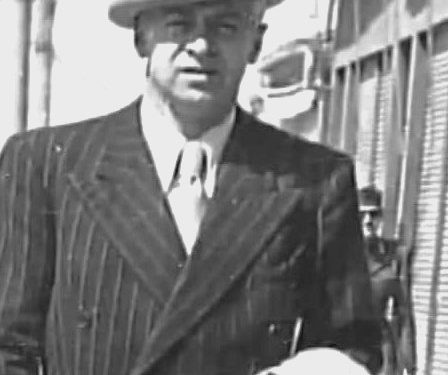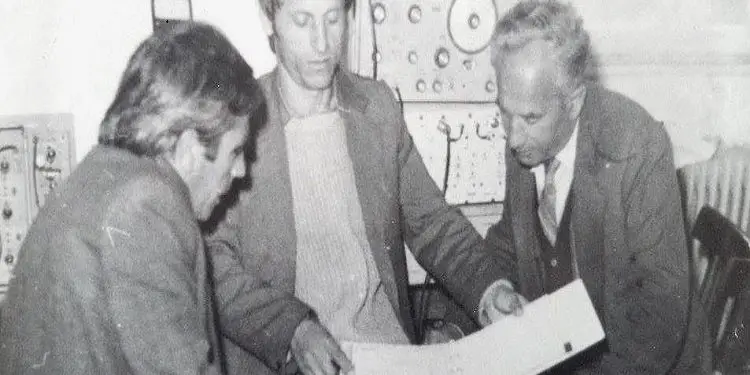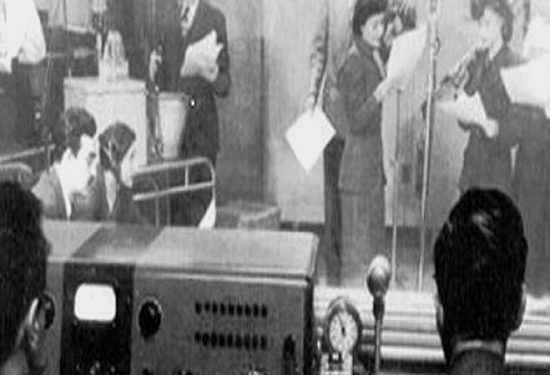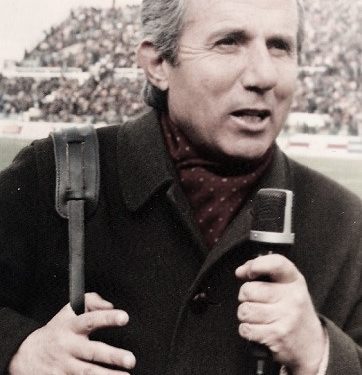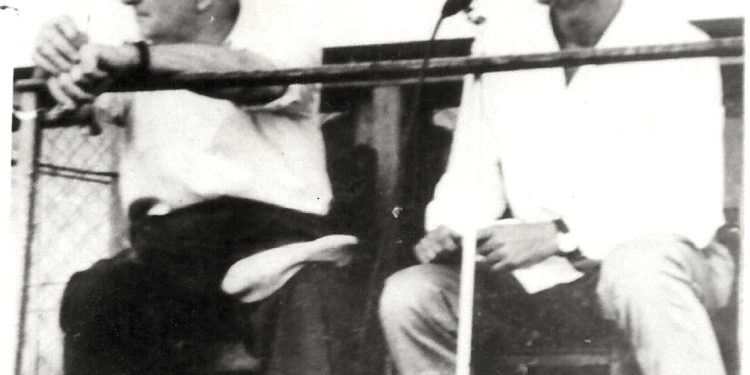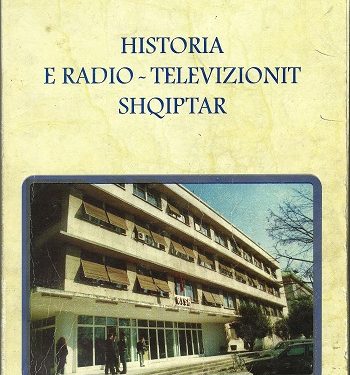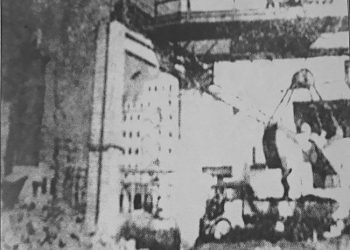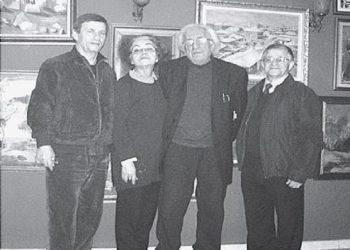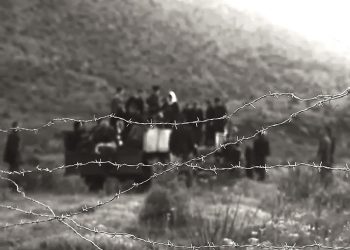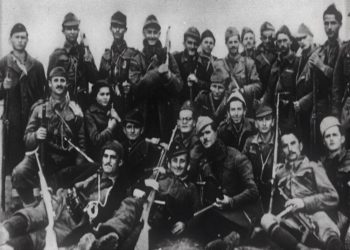From Skifter Kelliçi
Part four
Memorie.al/ On November 28, 1938, on the occasion of the Independence Day, in a ceremony attended by important authorities of the country, with a speech held on the microphone of Radio Tirana, King Zog I inaugurated the rise of this institution, which over the years became so beloved and popular even for Albanians abroad. On this occasion, we are publishing the dossier “85 years of Radio Tirana”, prepared by journalist, publicist and writer Skifter Këlliçi, who worked for 40 years at Radio-Tirana, (1959-1999), first editor and then sports commentator and is also the author of the book “History of Albanian Radio-Television”, (1938-1990), published in 2003.
Continues from last issue
Young voices on the microphone
After Kalipi Plasar and Refik Bezhan, who were the first speakers at the Radio microphone, in the first years after the liberation, new voices were heard: Avni Skrapari, Eleonora Prosi and Hysen Vendresha. However, as the programs expanded, the need for additional speakers was also felt. Thus, in the summer of 1947, Radio Tirana announced a competition in which many young people participated. The winners of the competition were Haki Beleri and Viktori Xhaçka, who became among the best radio speakers (the latter mainly for music shows).
Excluding the first radio chronicle on the day of the liberation of Albania, on November 28, 1944 in front of the tribune, where the partisan forces paraded, which we talked about in the second part of this cycle, the term radio chronicle was almost never used. in Radio programs. However, in the program dated September 16, 1946, it is read: “6 p.m. – Great Youth Action, radio news recorded on discs on the Kukës-Peshkopi road.”
As Emil Plumbi, the author of this radio chronicle, recalled, in the absence of a tape recorder, German-made decilite soft discs were used, which during the years of occupation and after, served to record the speeches of fascist and communist leaders. As far as we know, the above radio chronicle was also recorded with such discs, the first in the history of Radio-Tirana. Technically, the Italian engineer, Antonio Galeaci, helped to prepare this radio-chronicle. The voices of some activists, the sounds of mine explosions were recorded, which helped to prepare this radio chronicle as well as possible.
Until 1947, over 50 employees worked in all sectors of Radio-Tirana. The director continued to be Petro Kito, the deputy director, Findia Veizi, who replaced Alqi Kristo, the head of the music sector, Mihal Ciko, Mustafa Krantja, who would later become the most popular conductors, then the journalists Pirro Naçe, Nihat Uruçi and associates young, like; Mark Gurakuqi, Fatmir Gjata, Lazar Siliqi, Jusuf Alibali; in the technical sector, Todo Bojdani, Spiro Qirko, Xhafer Zavalani, Met Huta, Kaliopi Prifti, translators for broadcasts in foreign languages, Vasil Papajani, Viktor Kraja, Lidia Trendafillova, Lili Adams, Age Bojaxhi, Mother Teresa’s sister, then a priestess in India, which would later cause this translator to leave Radio and others.
Efforts to determine the airwaves of Radio Tirana
From June 24-28, 1946, Albania participated in the meeting of the General Constitutional Assembly in Brussels, in which the broadcasting delegations of all 26 countries of the European area, including Albania, approved the status of OIR, (International Broadcasting Organization). One of the most important problems that were raised in this meeting and in other meetings that were held afterwards, was the allocation of radio waves.
At other OIR meetings held again in Brussels, Copenhagen, Atlantic City, Geneva, Mexico, careful work was done to finally define the Radio waves. In these conferences, our country was represented by Petro Kito, director of Radio-Tirana, who knew French and Italian very well. In them, the problem of frequency planning for short, medium and long wave stations was presented.
At the Copenhagen conference, held in October 1948, medium and long waves were finally determined for the countries of the European area. At the end of this conference, the convention and plan for the allocation of airwaves, known as the “Copenhagen Plan”, was approved, which entered into force in 1950. According to it, our country was assigned 4 frequencies, to be used by stations of Tirana, Korça, Shkodra and Gjirokastra.
Until 1948, Radio Tirana maintained connections mainly with Yugoslavia, which was preparing to turn Albania into the seventh republic. After the Yugoslav Broadcasting conference, in which our country also participated, (November 1947), in the magazine “Radiobroadcasting”, it was written as follows: “This conference is of great importance for our broadcasting. As in any sector, as in the broadcasting sector, our country will have the valuable help of Marshal Tito’s Yugoslavia. Therefore, in the development and strengthening of the Yugoslav Broadcasting, we look at the development and strengthening of our broadcasting.”
But the “honeymoon” between the two countries, as it is known, did not last long. This was also reflected in the relationship between the two broadcasters. In 1947, a delegation from the Yugoslav Broadcasting Committee, headed by Zvenko Rusič, came to Tirana uninvited. He requested that more events from Titista Yugoslavia be included in Radio-Tirana’s broadcasts. (“History of Radio Tirana”, magazine Radiopërhapja, no. 1,2,3. 1952). And here, on June 30, 1948, the Resolution of the Informburo is announced, where the Yugoslav Communist Party is described as an agent of imperialism. Relations between two countries and, necessarily, between two radio stations. The 20 kv medium wave radio station, which our government had bought in France, does not reach the port of Durrës.
Such a fact is also confirmed in a report of our Broadcasting Directorate, addressed to the Prime Minister, which states: “This station was bought through Yugoslavia, by the French firm “Thomson-Hudson” and arrived in Rijeka. But with the release of the Informburo communiqué, the Yugoslav authorities stopped the departure of this station to Durrës and kept it for themselves”. (AQSH, file 4, page 155). The same phenomenon would occur in December 1961, when relations with the Soviet Union would be broken, and in July of 1978, with China. Albania would remain alone. So would RTSh. So for years and years, because of the adventurous policy pursued by the dictator Enver Hoxha, in every field, including the field of culture and art.
Some of the managers of Radio Tirana after the liberation
Petro Kito
After the first director of Radio-Tirana, Gjergj Buban, (1938 to 1944), who in the “Special Court” of the following year, was sentenced to six years of imprisonment, the first director after the liberation, in December 1944, Petro Kito was appointed. He graduated from the ‘Normal’ school in Elbasan, where he learned French, a language he spoke fluently, and Italian. It was this advantage that gave him the opportunity, as we have mentioned above, to participate in as many international conferences, held even as far as Mexico, for the allocation of Radio Tirana’s airwaves.
Petro Kito tried to push further the great experience gained during the years 1938-1944, which, as we have seen, was not small, moreover when a part of the cadres, editors and technicians, continued to worked in this institution. And the results were not missing, despite the fact that, being under the pressure of the communist dictatorship, the broadcasts were mostly politicized.
At different times, he had Alqi Kristo, who later became famous as a writer and translator, and the journalist Findia Veizi as deputy directors.
By nature, Petro Kito was a gentle and reasonable person. He evaluated new talents, he also sought the opinion of others on professional problems. In 1956, as it was said above, as a member of the bureau of the basic party organization of Radio-Tirana, he approved the discussion held by Vehip Demi, the head of the programming editor at the Tirana Conference, where the PPSh leadership was criticized, which was cut off from the masses and was not implementing the decisions of the 20th Congress of the Communist Party of the Soviet Union.
In January 1961, although he had asked to leave Radio, the senior leaders of the party saw fit to remain as deputy director, while the director’s place was taken by Thanas Nano, who came from the Central Committee of PPSh. Petro Kito received another blow after the 2nd Radio-Tirana Song Festival in December 1962, which was criticized by the communist leadership for influences from decadent bourgeois music. He was responsible for organizing this festival and thus allowing these mistakes.
In 1966, Thanas Nano, after the call of the Central Committee of PPSh, to work where the homeland needs, found the opportunity to circulate in Elbasan, where he was appointed director of the House of Culture. Of course, the floodgates were opened and the Tirana Conference was remembered. We say so, because Adriatik Kanani, who had finished his journalism studies in the Soviet Union, also circulated on the Radio, he was also one of the most ardent debaters at the Tirana Conference, when he was a journalist at “Zërin e Populli”. However, Petro Kito, (1919-1994), remained in the memory of Radio employees, as a good and loving leader. Different from…
Thanas Nano
The arrival of Thanas Nano, in January 1961, was met with timidity at Radio-Tirana. He had been for 13 years (1945-1958) director of ATSH (Albanian Telegraphic Agency). He then worked for two years in the Directorate of Propaganda of the Central Committee of PPSh. And from there, he became director of Radio, a position he remained in until January 1972, when in the meantime, he also became general director of RTS.
That year he left with conservative motivation, expressed by Manush Myftiu, member of the Political Bureau of the Central Committee of the PPSh and vice-chairman of the Council of Ministers, in a meeting of the RTS collective, to be replaced by Todi Lubonia. However, less than a year passed, in April 1973, he returned again, directly by order of the dictator Enver Hoxha, as a “strong hand”, which would avoid the hostile work of Todi Lubonja, who was sentenced to 15 years of imprisonment freedom, charged as; “enemy of the Party and the people”.
In the list of candidates for the post of general director of RTS, drawn up by the press department of the Central Committee of PPSh, as written by the well-known publicist, Marash Hajati, at that time an instructor in this directorate, Enver Hoxha made this note: “On Radio-Television, Thanasi would return (in Girokastrian dialect). We may have professional deficiencies, but he will not do the things of Todi”. (Marash Hayati, book “The back door of the press”, page 84).
Despite being dogmatic, Nano, as early as 1961, approved the proposal of Adriatik Kanani, responsible for the newsroom, for the creation of the “Evening Radio Magazine”, a program that became diverse and qualitative; also, it approved the creation of the dispatch department, for the control of broadcasts before transmission, and, what is most important, in 1962, it approved the creation of the Radio Archive, in 1962, where since then, in its fund have been preserved valuable radio materials.
In addition, he also encouraged the introduction of so-called live materials, i.e., radio chronicles and radio reports, a rare occurrence in radio broadcasts. In addition, he immediately implemented the Government’s directive that Radio Tirana broadcast programs from 8:00 a.m. to 12:00 p.m. and from 4:30 p.m. to 6:00 p.m., which were dead hours. Thus, Radio-Tirana began broadcasting shows without interruption, from 5:00 a.m. until 11:00 p.m. However, his personality was damaged by some negative traits. He was very reserved, rigid and pedantic. He created a certain group around himself, among them servile and mediocre. He fought, surprisingly skilled and took revenge on them. The clashes he had with talented journalists are known; Fadil Kokomani and Vangjel Lezho, two well-known journalists in the 60s, especially for artistic and literary show, and even later with the deputy director of the Radio, Nefo Myftiu…!
He despised the abilities of the Radio speakers, especially Vera Zheji and Feride Konomi, forcing them to work 8 hours a day, when by decision of the Council of Ministers, they were included in the category of actors, and had to work 6 hours…! Engineers and technicians also fought, including engineer Emil Plumbin, who had laid the technical foundations of the new Radio, which he launched in 1966 in Durrës, and then he also launched the veteran technician, Spiro Qirko. Nano never stood out as a journalist, and with his departure in January 1972, the RTS collective breathed a sigh of relief, especially since he was replaced by Todi Lubonja, the complete opposite of Nano, simple and close to the collective. But this collective was suppressed with the return of Nano, after a year. He came back even more pedantic, dogmatic and vengeful than before!
It proved these negative features even when at the beginning of 1975 with the second turnover of cadres, directed by the dictator Enver Hoxha, he removed talented cadres, such as; writer Ruzhdi Pulaha, critic Xhezair Abazi, journalists Kliton Gilani, Qemal Xhomo, Albert Shala, Fuat Memelli and others. There were even journalists who were going to retire in a few years and who had given so much to Radio for years, such as Findia Veizi, Maqo Afezolli, etc. At the same time, he purged all those who had become a “bridge” for him, because he no longer needed them. The RTS employees were finally freed to some extent, when in January 1976; he retired, at the age of 60 years and ten months, again as a “strong hand”…!
Ymer Minzhozi
For six years (1957-1963), he was deputy director of Radio-Tirana. It can be called unequivocally, leader-creator, if we consider that he was the best political commentator, for the notes of the day and the weekly comments, which stood out for a special style. There was a reason for this. In addition to his talent, Minxhozi read political and artistic literature in Russian, a language he had learned during his studies in the former Soviet Union, and then in Italian, a language he learned afterwards…!
He also stood out as a reporter and benevolent towards young journalists. Among them was me, a journalist since 1959 in Radio, who created very good relations with him. And I benefited from his experience. At the end of 1963, he was appointed correspondent of the newspaper “Voice of the People” in the People’s Republic of China and Vietnam. He proved his skills as a journalist and writer in several books he published, and continues to publish even now.
Nefo Mufti
Although she was not a journalist, when she was appointed director of Radio-Tirana (1967), she had the ability to quickly become familiar with its features and to approach, encourage and evaluate the best journalists and other personnel, which which Thanas Nano had never done. Although the wife of a member of the Political Bureau of the Central Committee of PPSh, she created warmth in her relations with all the employees. It was together with Todi Lubnja, the general director of RTS, the organizer of the 11th National Song Festival in RTS (1972) that was unjustly condemned by Enver Hoxha. As a result, in April 1973, he was dismissed from this position. But it remained in the memory of all the employees of this institution.
Kiço Pandeli
He holds the record in the Albanian press, because for 25 years, he was the director of Foreign Radio, (1963-1988), although, apart from a lame Russian that he had learned in the Soviet Union, where he had attended a party school, he was not good to learn a little French or Italian, because English was out of the question. A pedant like Thanas Nano, he became undesirable for all the journalists of the Foreign Radio. He had the mania to get his hands on their writings, being a mediocre journalist himself.
He had no respect for translators and speakers in foreign languages, so much so that he cut their remuneration to ridiculous amounts. He forced the talented translator, Robert Schwarz, to work in the corridor, in the cold and in the heat. He suffered from an inferiority complex. But this did not prevent him from being appreciated by the Central Committee of the PPSh, as an “outstanding political commentator”. Even from my friend Nexhmie Hoxha herself, with comments, sometimes borrowed from subordinate journalists. When he retired in 1988, no one at Foreign Radio remembered to arrange a farewell meeting with him…!
Portraits of the first speakers…!
Kaliopi Plasari (Nushi)
I was very young, no more than five years old, when I started listening to Radio-Tirana shows for the first time. And, among them, I still remember the sonorous voice of a woman who said: “This is Radio-Tirana! We are giving the news”!
This voice and after it other voices of men and women accompanied me until a day came when I too, in love with the microphone, asked to become a speaker at Radio Tirana. And I succeeded.
In August 1958, I even started reading the news broadcasts. A few months later, I was also assigned to read the 22.00 news, which was also the last news of the evening. And there I had the chance to read with that speaker, whose voice had aroused so much curiosity in me since childhood. This was Kaliopi Plasari, (Nushi, 1905-1979), who we have mentioned in the first parts of this cycle. Of course, I had known him for months, that I had started rehearsing in front of the microphone. But this time I would read together with him. And, not without emotion.
After we finished reading the newscast, I had a chance to express my impressions of her to her. He put his lip on the gas. That’s how I became friends with this woman, already old, who at the same time was reading the news show in French, a language she had learned since she was a child, when she had lived in France with her family, immigrated there for years.
Haki Beleri (1919-2003)
We mentioned above that in a contest for speakers organized at Radio-Tirana in the summer of 1947, Haki Beleri also won. After finishing his studies at the “Normal” in Elbasan, Hakiu studied literature for several years in Italy, which he was unable to complete due to the Second World War. Passionate about the violin, which would later lead him to the symphony orchestra of TOB, he, unwillingly, took part in the competition in question and also unwillingly, he was liked, and thus his fate was determined, to be the successor of the tradition of reading the news and commenting on the microphone.
Haki Beleri undoubtedly became a special voice in reading the news and especially the speeches of our leaders and the communist world. The leadership itself was directly interested in him, although it was known that he had a brother shot as a nationalist during the War. And here, an unexpected day. It was the evening of May 6, 1976, when Haki Beleri, on his way to the news broadcast studio, was stopped by the policeman on duty to enter. Surprised, he asked for an explanation, but he got it the next day. By order of that leadership, he would no longer read into the microphone, because of his brother being shot!
The terrible class war was reviving, which suited even the general director, Thanas Nano. Thus, when he was only 55 years old, Haki Beleri, this special voice of the microphone, was forced to leave Radio-Tirana. They also removed him from TOB, where he had been not only the first violin, but also the translator of such operas as; “Ladies with Camellias”, “Madame Butterfly”, “Tosca”, “Rigolet”, “Pearl Fishers”, etc. And it makes you sad when you think that only a fragment from the movie “Face to Face” is left of his voice “, because all the recordings of the texts read by him, since then disappeared from the Radio Archive, as “the voice of the enemy”! Before his death in 2003, RTSh fortunately produced a program complete, which reveals his activity as a rare speaker of Radio Tirana. Memorie.al
The next issue follows




